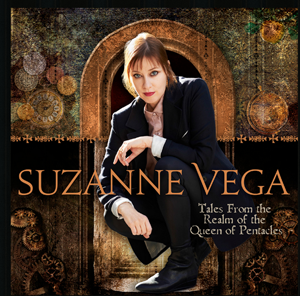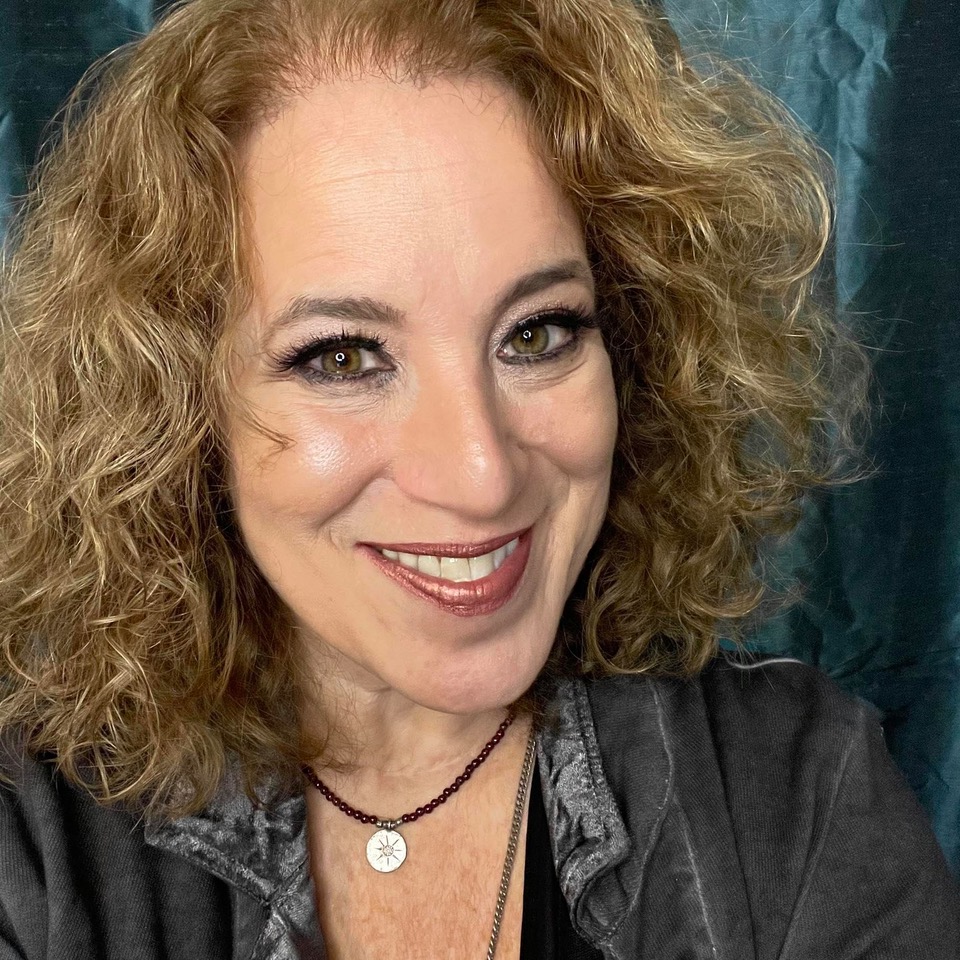Interview: Suzanne Vega on the Release of ‘Tales From the Realm of the Queen of Pentacles’
All the latest guitar news, interviews, lessons, reviews, deals and more, direct to your inbox!
You are now subscribed
Your newsletter sign-up was successful

With the release of her latest studio album on February 18,Tales From the Realm of the Queen of Pentacles, Suzanne Vega opens the door to an eclectic mix of carefully crafted works that give us a peek into her mastery.
This, her eighth studio album, comes after a hiatus of seven years. A stretch of time in which she was not idle, but perhaps re-focused. Vega spent the past few years writing songs on the road, recording parts of the album in Chicago, London, Prague, Los Angeles, and New York City. Now with Tales From the Realm of the Queen of Pentacles, Vega reassures us of her ability to mesmerize with unusual lyrical thoughts and arrangements.
Vega, perhaps best known for her hits “Luka” and “Tom’s Diner,” is no stranger to being placed in the “other” category for songs that break the mainstream mold. But truly, to me, this is what makes her work most endearing.
Produced by her guitarist and musical director, Gerry Leonard (David Bowie’s musical director for more than a decade) the release includes musicians Jay Bellerose, Zachary Alford, Tony Levin, Larry Campbell, Catherine Russell, and more.
Tales From the Realm of the Queen of Pentacles, delivers singable singles in songs like “I Never Wear White,” and “Don’t Uncork What You Can’t Contain,” plus deliciously lovely works of art like “Crack in the Wall” and “Silver Bridge.” This is the type of album that requires several listenings before it can be fully appreciated.
Here I sit with Vega as we talk about this new release and more…
A friend of mine told me that the Queen of Pentacles refers to a good and nurturing mother.
All the latest guitar news, interviews, lessons, reviews, deals and more, direct to your inbox!
All the cards in the tarot deck have a good side and a bad side. They’re sort of complete in that way. There’s no just good cards or bad cards. So, it can refer to a good and nurturing mother. The Pentacles are the suit that talk about the physical material world. So the Queen of Pentacles can be very nurturing.
But her bad side is that she can also be greedy and materialistic. A lot of the songs have to do with the body and wealth or lack of it. The Queen of Pentacles in the song in this case is sort of greedy and the fool is the opposite of that – he is free and he has no possessions.
The character in “Song of the Stoic” is someone who has worked hard for anything that he has and really feels it in his body, feels life in his body. So, that’s why I called it Tales from the Realm of the Queen of Pentacles, because the songs are about the spiritual life but as felt through the body. It’s kind of how we feel it here on Earth.
I am sort of in love with the song “Don’t Uncork What You Can’t Contain.” Can you talk about how that song came about and why you thought of sampling “Candy Shop” for that?
Well, let’s just say the idea of what you keep inside and what you let out has always been an issue, for me, personally. Some people have other issues in life. My husband, for example, his dichotomy tends to be “On the one hand, and on the other hand.” But mine tends to be what’s inside and what comes out.
So, I was thinking of that one day. I think I mean it to mean “Don’t stir up,” sort of a paraphrase of “Let sleeping dogs lie.” I sort of heard it in my mind one day as I was walking down the hall. A warning voice of advice saying, “Don’t uncork what you can’t contain.” And then, I thought, I wonder if that’s an Irish saying or something. And it isn’t. I Google’d it and I didn’t find that phrase anywhere so based on that phrase, I started to play around with the ideas of Pandora’s box and the genie in a bottle and all kinds of things.
And Macklemore.
And Macklemore. Yeah, ‘cause the genie in the bottle, I was thinking, “How do I get this into the song?” And Macklemore’s song “Thrift Shop” was huge at that point. So, I thought, you might find an oil lamp in a thrift shop. And then I thought, “Oh, I’ll just jam him in the middle of the song” and I was really happy with that.
I love that.
And when I sing it live, I don’t always say Macklemore. Sometimes I say “Gerry,” who is the other person onstage with me, or someone in the audience. I change it around.
Right, that’s funny. And so how did you think of incorporating that 50 Cent song into it?
Well, it was part of a bunch of songs I had been playing for Gerry and we were sort of loosely talking about having something Arabic-sounding. The genie in the bottle is taken from the Arabian nights, so I’ve always liked Scott Storch’s Arabic-sounding strings. Scott Storch is a hip-hop producer, and that’s sort of one of his trademarks. He also, I don’t know if he still does, but back in the day, cost $90,000 a track. So, we weren’t going to go ask him for any favors, but it was Gerry’s idea to just sample it and put it in. And it worked so well that I thought, “Well, let’s do it.”
Can you give me some insight into your typical writing process?

Well, it turns out there isn’t any typical one. A few of these songs began as lyrics. In fact, I still have the original demos, which are almost more like spoken word. Then, I would sort of work on the melody. But then, a song like “There Is A Road Beyond This One” started with a melody. And I had to really work hard to figure out what the lyrics were going to be but the melody was playing absolutely clearly in my mind for a year or two before I actually got to sit down and write words.
So, it sort of begins in these random ways. I’m happy for any of it that I get. I have the feeling of sort of channeling it from another place at times. Whatever I get, I work with.
The lyrics on the songs are just so masterfully written. I just think they feel very natural even though the phrasing and the wording are unusual at times.
Yeah. I work on them. They sort of work on themselves when I’m going about my day. I get a great feeling of satisfaction when I’m able to put something in the right order with the right alliteration and rhythm and rhyme. It really thrills me in a way that very few other things do. I wish I had that capability with other things like style but that’s my particular happiness.
I sort of feel like songwriting is a puzzle like when you find the right piece, it’s pretty satisfying.
Yeah, it’s thrilling. It’s very satisfying, especially if you think for a while that there might not be an answer to it when you’re working on something for a month or two.
The roster of musicians on this album is just fabulous. So, did you bring some of those people into the studio with you or did they record in other locations?
Yeah, we worked upstate in Rhinebeck, New York. We did a core of things. We really had to be careful how we recorded this album because the budget was so tight and time, therefore, was also so tight. So, we had say two groups of four days to do the whole thing. In eight days total. So, therefore, we spent less than half a day on each song or. Gerry would plan out what we were going to do in the day and then we would get it done.
Gerry seems essential for your process.
At this moment in time. The fact is that with every album, I’ve always had a partner there to nudge it along.
The first two albums, I worked that way with Steve Addabbo, who is one of the producers. And he was the guy who would like wake me up in the car if need be, drag me into the studio, nudge me along.
And with Days of Open Hand, that person was Anton Sanko. With the other two, it was Mitchell Froom. So, sometimes it’s the producer but sometimes it’s Mike Visceglia, my bass player.
I think it’s because I’m sort of an introspective person. If I don’t get someone outside of me going, “Hello?” then I get a bit bogged down. So, it’s been helpful. In this case, it was Gerry and he was happy to do it. He’s really good at it and we reached a nice flow and we got everything done.
You’ve been playing this material live for some time now. Is there a song or two on the album that you really enjoy playing live?
Mmhmm. I really like “I Never Wear White,” because it’s the least metaphoric of all the songs. It’s a song you either get and like or don’t relate to. I was really surprised by how many people all over the United States, whether it was Seattle or Arkansas, you kind of expect it in New York but in Ann Arbor, Michigan, I don’t know. I was amazed at how many people embraced that song. I thought it was really great.
And I like “Crack in the Wall,” which has sort of a joyful quality. I’m still learning how to sing “Horizon.” It’s got some notes in there that are kind of slightly beyond my reach. It’s still a thrill to sing it. It’s such a different song for me.
Did you play any instruments on the album yourself?
I played guitar. It’s pretty much what I play. I played guitar on “Crack in the Wall.” Not on everything, but that is the only instrument I play. I did hand claps on “Jacob and the Angel.”
Can you tell me about your guitar?
I have a couple. The one I play live these days is a beautiful handmade Furch Guitar from the Czech Republic. It’s a company that is run by a man and his son. It’s like a family business and we did a tour of their factory and the inlay is just beautiful. It has a warm sound, and you’re able to amplify it beautifully and warmly and that’s kind of what matters to me. It has a nice warm, acoustic sound, where you can dig into it with a flat pick, but you also want the delicate, clear sound of the picked notes. So, that I find works really well.
And before that, I had a Taylor that I loved. I got that Taylor in 1996 and that was a favorite, that particular one. I think I also, in this album, I have played my Martin guitar, which is an old one from 1940. It’s a really lovely guitar.
I’m guessing you don’t tour with that one.
I don’t tour with that one. That one stays home in its little case, and I just take it out once in a while to play at home or I use it for recording. And we also had a nylon string that Gerry asked me to play. I think it’s his own nylon string, but I used that for “Portrait of the Knight of Wands.”
How did you find out about Furch?
Through Gerry. Gerry’s sort of a guitar magnet. He’s David Bowie’s musical director, also, so he works with a Czech band called Čechomor. I think Furch found him, and they got him the guitar. Then they asked if I wanted one, and I said, “Sure, why not?” I checked it out and I really love it, it’s great. They’re handmade and pretty lovely. You can feel that it is lovely.
Do you use any alternate tunings or open tunings in your songs?
No, I don’t. I’m drawn to that sound but I get that sound by using weird fingering and placements on the guitar. I’m not a person who has studied music theory so very often, I don’t really know theoretically what I’m doing, but I know what I like and I know what fits with other chords. So most of it comes down to fingerings for me or using the capo. But I use plain old tunings, but I don’t always use all six strings.
I’m going to have to watch your hands when you play to see what you’re doing. So, what’s next for you? You’ll be touring some more?
Touring a lot. Yes, this year is basically tour, tour, tour. We’ll go to Japan and Australia and then come home. And then in May, I start the U.S. tour and that’s going to be very exciting!
Find tour dates at more at www.suzannevega.com/
Laura B. Whitmore is the editor of Guitar World's Acoustic Nation. A singer/songwriter based in the San Francisco bay area, she's also a veteran music industry marketer, and has spent over two decades doing marketing, PR and artist relations for several guitar-related brands including Marshall and VOX. Her company, Mad Sun Marketing, represents Dean Markley, Peavey Electronics, SIR Entertainment Services, Music First, Guitar World and many more. Laura is the founder of the Women's International Music Network at thewimn.com, producer of the She Rocks Awards and the Women's Music Summit and co-hosts regular songwriter nights for the West Coast Songwriters Association. She was recently elected to the city council of SongTown USA, a Nashville-based support group for songwriters. More at mad-sun.com.
Laura B. Whitmore is a music industry marketing veteran, music journalist and editor, writing for Parade.com, Guitar World, and others. She has interviewed hundreds of musicians and hosts the She Rocks Podcast. As the founder of the Women’s International Music Network, she advocates for women in the music industry and produces the annual She Rocks Awards. She is the Senior Vice President of Marketing for Positive Grid, making the world safe for guitar exploration everywhere! A guitarist and singer/songwriter, Laura is currently co-writing an album of pop songs that empower and energize girls.

